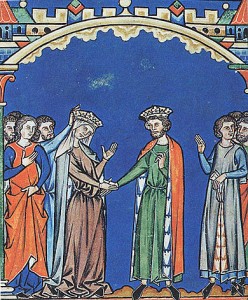The Sobering Sentence
When the wife of Uriah heard that Uriah her husband was dead, she mourned for her husband. And when her mourning was over, David sent and brought her to his house, and she became his wife and bore him a son. But the thing that David had done displeased the Lord. (2 Samuel 11:26-27)
The cover-up was complete – or so it seemed. When Bathsheba became pregnant from King David’s adultery, instead of confessing, David covered it up. Her husband – one of David’s mighty men, named Uriah – was away at war and everyone would know that Bathsheba’s pregnancy was due to adultery. First David tried to cover it up by bringing Uriah and Bathsheba together, so it would appear that the child could be Uriah’s. After repeated attempts, that plan didn’t work. Finally, David had Uriah deliberately killed in battle so he could quickly take Bathsheba as a wife and so Uriah could not reveal the offense.
Therefore, when Bathsheba heard that her husband died in battle, we have no reason to believe that she was particularly grieved. She probably did not know that David arranged the death of her husband – it is likely that David concealed all this from Bathsheba. At the same time, she was partly relieved to hear of her husband’s death. She may have even been inwardly glad, because now she would not be exposed and punished as an adulterer and she could become the wife of King David.
Which is exactly what David did – our passage simply says, “And she became his wife.” This was nothing new for David. He had added wives before and this was simply one more. The cover-up worked even better than expected, because now David was something of a hero in the eyes of the people. Here was the poor widow of one of his mighty men, whom David compassionately took into his own care. People might say, “Look at how David cares for the widows of his fallen soldiers!”
Just when we think the cover up was a complete success, we read the sobering sentence: “The thing that David had done displeased the Lord.” This is the first mention of God in 2 Samuel 11. God witnessed every event and read the intent of every heart, but His displeasure is only implied until this specific statement.
How did the displeasure of God show itself? David didn’t have the same relationship he once did with God. David describes this season of barrenness in his walk with God in Psalm 32:3-4:
When I kept silent, my bones grew old
Through my groaning all day long.
For day and night Your hand was heavy upon me;
My vitality was turned into the drought of summer.
Psalm 32 shows that David was under intense conviction during this time and all the joy in his life evaporated away. David knew the stress and agony of living a double, false life. He found no relief until he repented and got right with God again. It was a time of deep agony for David, all the more painful because he was in fact a good man, a man after God’s heart. As F.B. Meyer wrote, “The better the man the dearer the price he pays for a short season of sinful pleasure.”
David was in that terrible place where he had too much sin in him to be happy in God, but he had too much of God in him to happy in sin. Because David was a man after God’s heart, God would draw David to repentance and restoration.
God generously forgave David, but it began with restoring his recognition of sin. He needed to know – not just intellectually, but in a deep inward sense – that the thing that David had done displeased the Lord. If we have displeased the Lord in some way, it is better to know than to not know – so the matter can be addressed and cleansed by the great atonement of Jesus and we can be restored to true fellowship once again.




Leave a Reply
Want to join the discussion?Feel free to contribute!